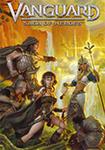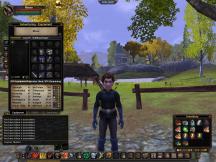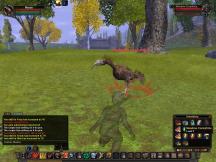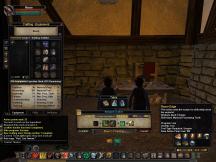Vanguard: Early Impressions
Potential may be the keyword for Vanguard. If World of Warcraft is that nerdy kid at school who has enough personality to get along with most everyone and have a decent number of female friends, Vanguard is the hulking geek that polarizes the masses into loving him for his interesting complexity or hating him for his dogmatism and outmoded eccentricity.
Vanguard is big and it's attempting quite a bit. I started playing the beta a month ago and have followed the game through launch. When I logged into the game for the first time, I was honestly concerned as things felt clunky and the polish just wasn't there. However, a slew of daily updates have brought the game to level that legitimizes its release. For an MMO, being ready for release doesn't just include bug-free gameplay, but content plays an equally important part. I've played new MMOs that had streamlined their mechanics only to fail in providing enough to do or wrapping activities into a meaningful narrative. This point may be Vanguard's greatest strength - not only does the game deliver content in spades, but it presents it within a convincing, fully-realized world.
To enter Sigil's new world, the player must decide between 19 races and 15 classes (each race limited to a varying number of classes). The new player is greeted with a deluge of stats and numbers as they create their character. It is nice to know so much up front, but this is the first taste of complexity to come. Races have been divided by the three continents they call home. There are four types of humans, four types of elves, several small races, a couple green races, and a few anthropomorphized beast races to satisfy the furry demographic. Classes have been divided into four categories. These break down into healers, casters, defensive fighters and offensive fighters. Traditional archetypes like Paladins, Sorcerers, and Clerics are available as well as some interesting spinoffs like Dread Knights that snowball their damage by debuffing their targets or Blood Mages who vampirically suck hitpoints from enemies and give their own hitpoints to allies. The game seems structured so that all classes hit the ground running early on with diversification and strategy showing up as one moves into the higher levels of one's class.
Vanguard breaks up playing time into four domains: adventuring, crafting, harvesting, and diplomacy. Each of these domains involves its own equipment and a character's appearance changes based on the role they are performing at the moment. While a character may be wearing chainmail while she fights, she changes to an apron and a toolbelt while she is crafting. The aesthetic nature of this is very gratifying and enhances the range of activities available. However, the vast array of equipment a player may find himself managing could be overwhelming to those who thrive on simplicity, but enticing to those who love collecting new items.
Adventuring is the questing/fighting realm of the game and its activities are parallel to questing in Everquest 2 (EQ2) and World of Warcraft (WoW). Half of the quests are of the "kill 4 monsters" or "deliver this potion to this sick guy" type, but I found these broken up by tasks like catching baby scorpions and then releasing them in a camp full of ratmen to create a distraction. The quest writing is strong and the creative scenarios wrapping the traditional quest formulas has kept things fresh and interesting. The world is seamless, but the intro quests are structured to gradually move the player from a starting zone into new parts of the world. At about level five, the player is sent to a city or town that acts as a hub for their race and introduces the player to the other spheres of the game.
Crafting and Harvesting are combined into a single domain in Vanguard's promotional media, but both can be played independently and are different enough to be considered separate activities. At first glance, one may be quick to compare Vanguard's crafting system to that of EQ2. The player builds the progress of an item while they fix complications that may arise with their abilities. In EQ2, crafting happens in real time, but in Vanguard, the system is a turn-based. This difference is huge. I personally found EQ2'sVanguard's turn-based system much more agreeable as choice and strategy have a much more important role in how an item turns out. As a player builds an item, he has a limited number of action points to use. Each action can push the item towards completion or enhance the item's quality, sometimes it can do both. As the player chooses his actions, he must choose between making the item better and actually finishing it. Complications that arise are varied and can affect the process in different ways. One complication can slow the player's progress, while another can damage the quality if it goes unfixed. As a player levels in crafting, he improves at how well he performs actions and he gains new abilities that may help him achieve a higher quality item in less amount of time. At first try, I made the mistake of trying to make a bunch of low quality items really fast to level and found the repetition grueling. When I began trying to engage the system and taking on the challenge of making higher quality items, I found that I was quickly rewarded with better experience and new abilities that added to the choices in the crafting process.
In the crafting system, Vanguard has also made a good choice in separating the crafting of new items from the process of leveling one's crafting skill. Most leveling occurs by work orders doled out by NPCs. The NPCs provide the materials for these and the player only has to bring some cheap consumable goods to the table. Recipes for real items are separate from these and this saves the player from using rare materials to make that special longbow 10 times before she's a high enough level for it to come out right.
The harvesting system involves roaming the land for various resources such as ore, animal skins, and lumber. Lumberjacking may be the most fun as trees actually fall down and lay on the ground after they've been cut. Vanguard has added some interesting multiplayer elements to harvesting and players are rewarded for harvesting in groups. If multiple players work together on the same resource, they get a greater return and a better chance at harvesting rare materials. This is a welcome innovation when competition for resources can be annoyingly high in other MMOs. To incentivize harvester cooperation, the game allows an ore miner to help cut down trees as long as he's helping a lumberjack and vice versa.
The diplomacy system is a game within itself and is built on a trading card game model. To begin diplomacy, a player engages an NPC in a parley. Within this parley, opponents play their cards in an attempt to win the discussion. Dialogue accompanies the game as the player makes successful progress. The game is fun, but only moderately challenging early on. However, some parleys have sent me back to my deck for new cards more than once. The dialogues contribute to a good chunk of the the enjoyment of the parleys, so players disinterested in narrative will have to rely on strategy or challenge to be engaged. The dialogues are creative and well-written, adding a lot of story and character to the world and in this respect could do a lot to fatten the story-thin environments of other MMOs. The diplomacy sphere also features a civic diplomacy system by which players can work together to influence citizens of a city until a mass buff is rewarded to the local players. Its apparent that Sigil wants to communalize all spheres of the game and it will be interesting to see if players take them up on it.
Beyond these spheres, Vanguard reintroduces some MMO mechanics that I think many assumed were a thing of the past. Corpse looting, for example, has been a particularly controversial feature. However, in its current implementation, I don't find it much different than retrieving your shard in WoW. With resurrect spots interspersed throughout the world, I've never been more than five minutes from my corpse and equipment is bindable so they player doesn't restart completely naked. Non-instanced dungeons has been another throwback brought back in Vanguard. My feelings waver on this one. I like the idea of my own private dungeon, but I've also enjoyed the fluidity of forming and reforming groups in a public dungeon that you don't find when trying to invite others to an instance. We'll see however if the developers' plans to thwart the exploits that can arise in a public dungeon are successful.
Of all its features, I think the game's hardcore nature is really its most polarizing aspect. It's complex and it's hard to say whether the massive numbers of new MMO players coaxed in by WoW will be ready to move on to something that might be more demanding. More than one review will undoubtedly refer to Vanguard as Everquest's
true spiritual successor and I'll probably agree with them. The game really feels like the early days of MMOs when games were trying a lot of new things. The most recent generation of MMOs has found unprecedented success in refining what we've learned and what we know works, but it's refreshing to play a game branching out into new territory. The new territory is large and I haven't even gotten into what the game is doing with mounts, player-made boats, and personal housing. It will be interesting to see how these work out as a player moves into the higher levels of the game and I'll keep MMOWatch informed as I do.

Information about
Vanguard: Saga of HeroesDeveloper: Sigil
SP/MP: Massive
Setting: Fantasy
Genre: MMORPG
Combat: Real-time
Play-time: Unlimited
Voice-acting: Unknown
Regions & platforms
World
· Homepage
· Platform: PC
· Released: 2007-01-30
· Publisher: SOE
More information






